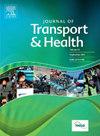“It's good for the community to see real people like them on the bike”: Exploring e-bike support in Aotearoa New Zealand
IF 3.3
3区 工程技术
Q2 PUBLIC, ENVIRONMENTAL & OCCUPATIONAL HEALTH
引用次数: 0
Abstract
Background
Equity-focused e-bike support programmes are likely to have an important role in growing the mode share of cycling. In Aotearoa New Zealand, equitable approaches to cycling need to include approaches that are led by and for Māori. Previous work promoting cycling in Indigenous Māori communities has identified the need for culturally relevant, inclusive programmes which focus on cycling as an activity that benefits families and communities as well as individuals. This research explores the holistic health effects of a long-term Indigenous e-bike programme.
Methodology
HIKO is an e-bike programme providing long-term e-bike loans and wrap-around cycling support in a suburban community in Aotearoa New Zealand, through a Māori health and social service provider. Focus groups and interviews were conducted with 26 HIKO participants over the first 12 months of the programme. Data were analysed thematically, using an Indigenous Māori framework of holistic health and wellbeing (Te Pae Māhutonga).
Results
Participants used their e-bikes for recreational and transport cycling. Prior to the programme participants did not cycle regularly, if at all, and largely described e-biking as an unfamiliar activity. Using the domains of Te Pae Māhutonga, we explore four themes: the necessity of trusted leaders, strong relationships and community input; e-biking as supporting cultural and environmental connections; e-biking as supporting healthy lifestyles; and e-biking as enabling greater social participation and family connectedness.
Conclusions
Appropriately designed e-bike support programmes have an important role in broadening equitable access to cycling. This study underscores the importance of considering the needs of families in designing cycling programmes, infrastructure and policies. It also highlights the role of health improvement as a motivating factor for taking up e-biking.
“看到像他们这样的真人骑在自行车上,对社区来说是件好事”:探索新西兰奥特罗阿的电动自行车支持
以公平为重点的电动自行车支持计划可能在增加自行车模式份额方面发挥重要作用。在新西兰奥特罗阿,公平的骑行方式需要包括由Māori领导和为Māori服务的方式。以前在土著Māori社区促进骑自行车的工作已经确定需要制定与文化相关的包容性方案,重点是将骑自行车作为一项有益于家庭、社区和个人的活动。本研究探讨了长期土著电动自行车计划的整体健康影响。hiko是一个电动自行车项目,通过Māori健康和社会服务提供商在新西兰奥特罗阿的郊区社区提供长期电动自行车贷款和环绕式自行车支持。在该计划的前12个月,对26名HIKO参与者进行了焦点小组和访谈。使用土著Māori整体健康和福祉框架(Te Pae Māhutonga)对数据进行了专题分析。结果参与者将电动自行车用于娱乐和交通骑行。在该项目之前,参与者不经常骑自行车,如果有的话,而且大部分人认为电动自行车是一种不熟悉的活动。通过Te page Māhutonga网站,我们探讨了四个主题:值得信赖的领导者、牢固的关系和社区投入的必要性;电动自行车支持文化和环境的联系;支持健康生活方式的电动自行车;电动自行车可以促进更多的社会参与和家庭联系。结论设计合理的电动自行车支持方案对促进公平骑行具有重要作用。这项研究强调了在设计自行车项目、基础设施和政策时考虑家庭需求的重要性。它还强调了健康状况的改善是人们骑电动自行车的一个激励因素。
本文章由计算机程序翻译,如有差异,请以英文原文为准。
求助全文
约1分钟内获得全文
求助全文

 求助内容:
求助内容: 应助结果提醒方式:
应助结果提醒方式:


